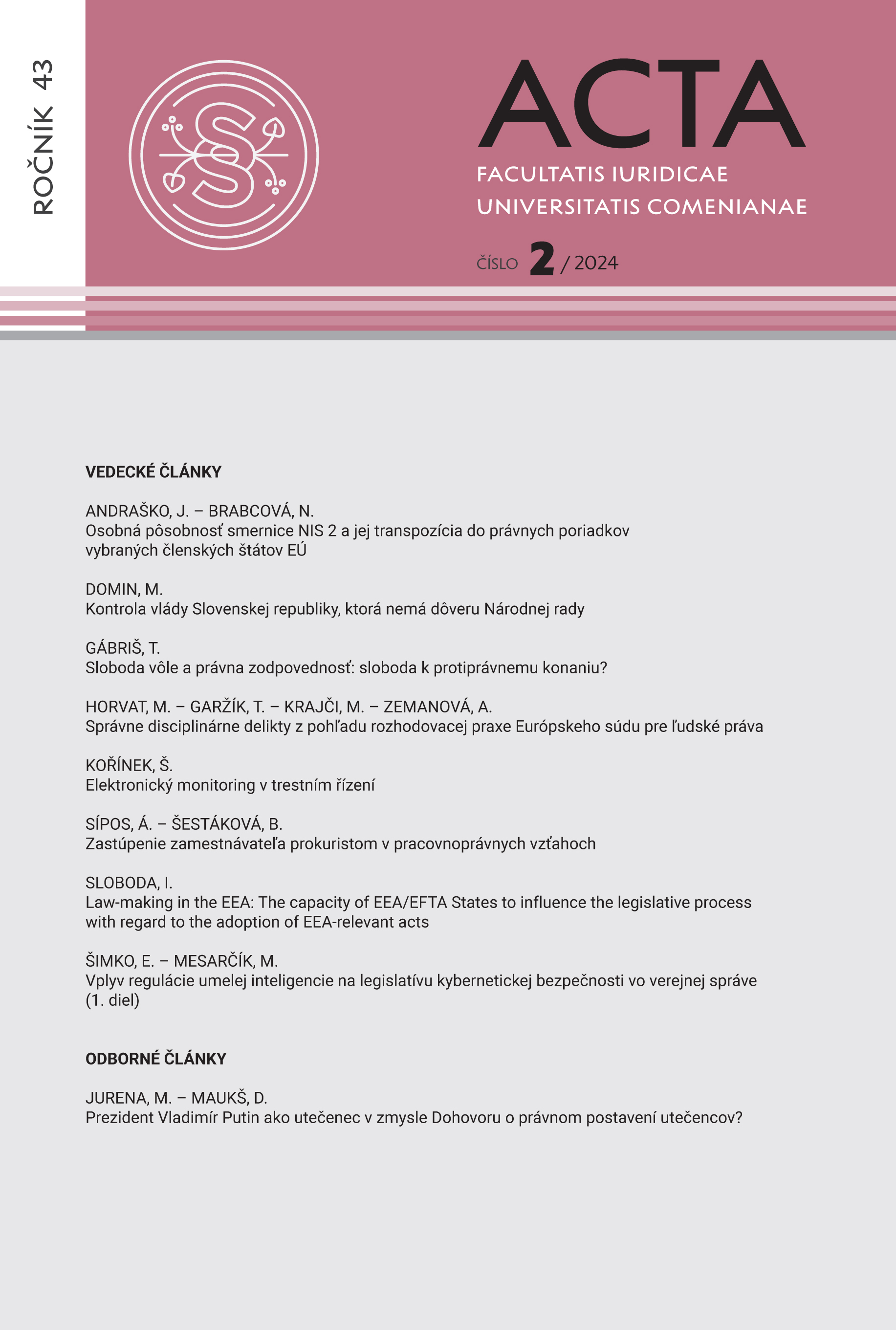Law-making in the EEA: The capacity of EEA/EFTA States to influence the legislative process with regard to the adoption of EEA-relevant acts
DOI:
https://doi.org/10.62874/afi.2024.2.07Kľúčové slová:
EEA, EFTA, EEA EFTA Comments, Decision Shaping, Legislative ProcedureAbstrakt
As members of the European Economic Area (EEA) but not of the European Union (EU), Norway, Iceland and Liechtenstein have specific mechanisms through which they can influence EEA law and thus EU law. However, their ability to enforce amendments to acts adopted in the EU is limited compared to EU Member States. They can propose amendments and provide input during consultations and decision-making processes, but ultimately must rely on negotiations and agreement with the EU to incorporate these changes. Direct enforcement of amendments to EU legislation is not within their legal powers, which highlights the limitations of their status as non-EU members within the EEA. In the present article, we look at the different ways in which Norway, Iceland and Liechtenstein can interact with EEA and EU legislation and influence its shape at different stages of the legislative process. In particular, we will focus on a content analysis of EEA/EFTA comments over the last thirty years since the EEA was established.
References
1. Agreement on the European Economic Area
2. Agreement between the EFTA States on the Establishment of a Surveillance Authority and a Court of Justice
3. Arnesen, F., Haukeland, H. H., Graver, P. H., Mestad, O., Vedder, Ch., Agreement on the European Economic Area A Commentary – 1. ed. – München, Germany: C.H. Beck, 2018 – 1141 p. ISBN 978-3-845-27579-6
4. Budenbacher, C. The Handbook of EEA Law / Carl Baudenbacher – 1. ed. – Springer Cham, 2015. – 859 p. ISBN 978-3-319-24343-6
5. Baudenbacher, C. The Fundamental Principles of EEA Law / Carl Baudenbacher – 1. ed. – Springer Cham, 2017. – 251 p. ISBN 978-3-319-45189-3
6. Baur, G., Rydelski, M., S., Zatchler, C.: European Free Trade Association (EFTA) and The European Economic Area (EEA) – 2. ed. – Alphen aan den Rijn: Kluwer Law International B.V., 2018. 189 p. ISBN 978-94-035-0010-2
7. Decision of the Standing Committee of the EFTA States No. 1/94/SC of 10 January 1994 Adopting the Rules of Procedure of the Standing Committee of the EFTA States
8. EEA Joint Committee online: https://www.efta.int/eea-relations-eu/eea-institutions-two-pillar-structure/eea-joint-committee
9. EEA Council online: https://www.efta.int/eea-relations-eu/eea-institutions-two-pillar-structure/eea-council
10. EEA Joint Parliamentary Committee online: https://www.efta.int/about-efta/advisory-bodies/parliamentary-committee/eea-joint-parliamentary-committee
11. EEA Consultative Committee online: https://www.efta.int/about-efta/advisory-bodies/consultative-committee/eea-consultative-committee
12. EEA Institutions - Two-pillar Structure online: https://www.efta.int/eea-relations-eu/eea-institutions-two-pillar-structure
13. EFTA Court: The EEA and the EFTA Court Decentred Integration – 1. ed. – Hart Publishing, 2015. – 596 p. ISBN 9781849466264
14. EFTA Bulletin 1/2002, The European Economic Area: Decision Shaping and Participation in Committees
15. EFTA Bulletin 1/2009, Decision Shaping in The European Economic Area
16. Frommelt, Christian. 2019. “The two-pillar structure of the EEA”. Online: https://www.efta-studies.org/the-two-pillar-structure
17. Haugevik, K. (2017). Diplomacy through the back door: Norway and the bilateral route to EU decision-making. Global Affairs, 3(3),
277–291. https://doi.org/10.1080/23340460.2017.1378586
18. Interinstitutional Agreement of 20 May 2021 between the European Parliament, the Council of the European Union and the European Commission on a mandatory transparency register
19. KORKEA-AHO, E. “‘Mr Smith Goes To Brussels’: Third Country Lobbying and the Making of EU Law and Policy.” Cambridge Yearbook of European Legal Studies 18 (2016): 45–68. https://doi.org/10.1017/cel.2016.1.
20. Korkea‐aho, Emilia. (2023). The End of an Era for Foreign Lobbying? The Emergence of Foreign Transparency Laws in Washington, Canberra and Brussels. JCMS: Journal of Common Market Studies. https://doi.org/10.1111/jcms.13396
21. Priorities of the Norwegian Chair of the EFTA Standing Committee First half of 2023
22. Priorities of the Liechtenstein Chair of the EFTA Standing Committee Second half of 2023
23. Priorities of the Icelandic Chair Standing Committee of the EFTA States First half of 2024
24. Standing Committee of the EFTA States online: https://www.efta.int/eea-relations-eu/eea-institutions-two-pillar-structure/standing-committee-efta-states
25. Subcommittee I on Free Movement of Goods: EEA EFTA Comment on the revision of the Vehicle General Safety Regulation and the Pedestrian Safety Regulation
26. Subcommittee I on Free Movement of Goods: EEA EFTA COMMENT on the Commission proposal for a Regulation of the European Parliament and the Council amending Regulation (EU) 2019/631as regards strengthening the CO2 emission performance standards for new passenger cars and new light commercial vehicles in line with the Union’s increased climate ambition – (COM(2021) 556
27. Subcommittee II on the Free Movement of Capital and Services: EEA EFTA Comment on the Commission Proposal for a Regulation of the European Parliament and of the Council on contestable and fair markets in the digital sector (Digital Markets Act) – COM/2020/842
28. Treaty on the Functioning of the European Union
29. Van Stiphout, Titus. 2007. "Homogeneity vs. Decision-Making Autonomy in the EEA Agreement". European Journal of Law Reform 9(3): 431-448. Online: https://heinonline.org/HOL/Page?handle=hein.journals/ejlr9&div=27&g_sent=1&casa_token=&collection=journals#
30. Working Group on Transport: EFTA Comment on the Commission Proposal for a Council Directive on Manning Conditions for Regular Passenger and Ferry Services Between Member States 2/TR/W/006 from 16. September 1998 online:
Downloads
Publikované
Číslo
Sekcia
License
Copyright (c) 2024 Acta Facultatis Iuridicae Universitatis Comenianae

This work is licensed under a Creative Commons Attribution-NonCommercial-NoDerivatives 4.0 International License.

